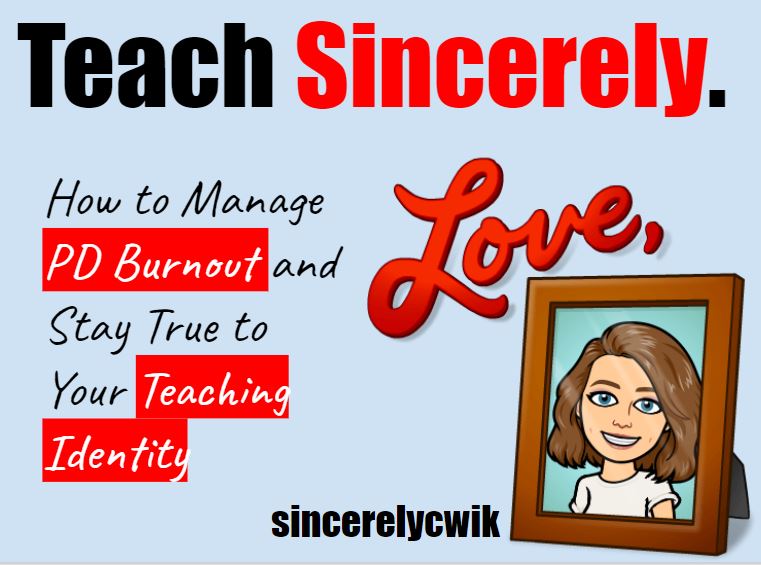|
I have been trained in AVID strategies, Project Based Learning, by the College Board, by NMSI, by Kevin Feldman. On 21st Century Learning, on the Four C’s, on MTSS.
Independently - this summer alone - I’ve read four professional books, viewed the #HiveSummit seminars, participated in multiple Twitter chats, and blogged about my own learning. It might be time to sign up for PDA. (No. Not the awkward kind we all try to ignore in the hallways.) Rather, Professional Development Anonymous. You know, recovery meetings for those of us who dive a little too deep into the world of professional learning. As a vice, it isn’t necessarily a bad one. I have loved (almost) every minute of my professional learning. The comedown of it, however, is starting to sully the high. Let me paint a little picture of my summer professional reading binge... June: After reading A Novel Approach by Kate Roberts, I decide to use her format of the full class novel, then book clubs, with awesome post-it annotation throughout! Yay! July: After reading Teach Like a Pirate by Dave Burgess, I decide that I need to make sure every single lesson is a winner - more action, more movement, more panache. Yay! August: After reading Be REAL by Tara Martin, I decide that I need more time for one-on-one, or REAL Talk, with kids, so I find ways to put in more talk time. Yay! Also August: I start reading 180 Days by Kelly Gallagher and Penny Kittle, and I decide to implement daily writing on top of my daily reading. Yay! Now: It’s less than two weeks out from Day 1, and as you might expect, my practice is being pulled in every which direction. I’m rewriting my lesson maps every day and frantically texting my AP Lang co-teacher to see if she’s on board to my radical changes. (Fortunately, she expects it from me….#teachersquad). And the worst of it is that on top of all these great new “must trys,” I also have standards and PLC collaboration and building initiatives that need to fit in somewhere too. It’s exhausting. And it burns teachers out. However… It doesn’t have to….. I hope. As I tend to do, I forgot my own advice: Teaching has always been a juggling act, but when we really think about all the directions we get pulled in, nothing is more important than staying true to what you value as a teacher. In other words, while I want to try every single idea I starred, underlined, or highlighted, I have to align every one of them to what I care about most - what I am most sincere about. That’s what Teaching Sincerely means. A Sincere Teacher is always looking to learn and grow, but they are also flexible enough to adapt to obstacles and find the potential in the dissonance that educational discourse can create. It's shamefully simple, really. A teacher just has to take time to reflect on what they are most passionate about, their “Why” as Tara Martin puts it in Be REAL. For me, it is teaching sincerely or authentically, so that I am always passionate about what is happening in my room and students are drawn in to that enthusiasm. For me, that means… ...kids need to read and write to discover what they are passionate about and to learn that their individual voice brings something completely unique to this world. ...kids deserve authentic and meaningful educational experiences that prepare them for life in all its forms. ...I need to be able to take risks and adapt to my kids, even if it doesn’t fit the “Year at a Glance.” ...I need to be the best version of myself as a teacher. Every day. These are all part of my Why. I will not sacrifice these things for any mandate or initiative. These are my BIG ROCKS. Once you know those priorities - or your own big rocks - all the new tricks, initiatives, and mandates can fill in like sand. So while there will always be a steady stream of great ideas and new approaches and amazing insights, a teacher who knows their BIG ROCKS can fight off the burnout of PD overload and embrace what they Sincerely care about. Consider: Are you Teaching Sincerely? Do you know your BIG ROCKS? Comment below with what makes up your big rocks.
0 Comments
Leave a Reply. |
Archives
February 2024
AuthorSteph Cwikla has been a teacher since 2012, focusing on ELA curriculum. Now, she also works as an instructional coach, helping other teachers improve engagement and instruction. |

 RSS Feed
RSS Feed